
 About JCP
Get Involved
Community Resources
Community News
FAQ
Contact Us
About JCP
Get Involved
Community Resources
Community News
FAQ
Contact Us

|
 |
 The Apache Software Foundation (ASF) was named
the JCP MEMBER OF THE YEAR
for having made the most significant positive impact on the community
through a demonstration of leadership, investment in the community,
and innovation. This membership-based, non-profit corporation provides
organizational, legal, and financial support for a large number of
Java-based, open-source software projects, including Apache Tomcat,
Apache Maven, Apache Ant, the many components of Apache Jakarta Commons,
Apache Struts, and Apache Geronimo, among many others.
The Apache Software Foundation (ASF) was named
the JCP MEMBER OF THE YEAR
for having made the most significant positive impact on the community
through a demonstration of leadership, investment in the community,
and innovation. This membership-based, non-profit corporation provides
organizational, legal, and financial support for a large number of
Java-based, open-source software projects, including Apache Tomcat,
Apache Maven, Apache Ant, the many components of Apache Jakarta Commons,
Apache Struts, and Apache Geronimo, among many others.
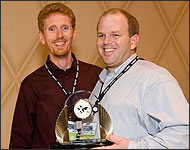 |
|
Geir Magnusson Jr.
accepts Member of
the Year award for ASF |
 |
A member of the JCP since its founding and an EC member since the Executive Committees
were formed, the ASF has worked closely with fellow EC members to bring about important
changes to the JCP program. For example, Reference Implementations (RIs) and Technology
Compatibility Kits (TCKs) are now allowed to be developed as open-source technology, and
a scholarship program was set up to provide free TCK licenses and support for qualified
non-
profits, individuals, and academics. The ASF hosts the source bases for several RIs
and has many independent compatible implementations of JSRs, and ASF representatives serve in
numerous Expert Groups.
As the ASF's representative on the EC, Geir Magnusson Jr.
accepted the award. He says, "We focused on bringing the principles and
benefits of community-based, collaborative open source to the JCP, helping
put the 'Community' in Java Community Process. Expert Groups are starting to
work in an open manner. There are lots of benefits to transparency."
NOKIA
Through the end of 2004, Nokia has shipped Java technology in approximately 180 million
devices and in more than 90 different device models based on the Series 40 Platform,
Series 60 Platform, and Series 80 Platform. Through this platform approach, Nokia offers
the highest volume opportunities for mobile developers. To contribute toward the Java
community's creation of leading-edge Java technologies, Nokia has been an active member in the
Java Micro Edition EC since its establishment in 2000. Nokia has also taken the lead, with key
partners throughout the industry, in more than ten essential JSRs in the mobile space, including
two JSRs for the Mobile Service Architecture (MSA) initiative -- JSR 248 MSA for CLDC and JSR 249 MSA
for CDC. In recent months Nokia finalized work on a number of JSRs for mobile devices, including JSR 226
Scalable 2D Vector Graphics, JSR 234 Advanced Multimedia, and JSR 238 Mobile Internationalization APIs.
Nokia also made good progress on JSR 257 Contactless Communication and JSR 256 Mobile Sensor APIs. Nokia
will continue to work with its industry partners to deliver exciting new experiences and features to
mobile phone users.
SIEMENS
Siemens is a leading member of the JCP Executive Committee (Java Micro Edition),
leads or co-leads more than 10 JSRs, and has experts in several other JSRs. For Siemens' more than 30,000 software developers, Java is a major language and platform for Siemens products and services. Siemens is committed to the JCP to actively shape Java's future together with the JCP community.
ORANGE FRANCE SA
Orange's contribution to the JCP program started in 2001 with JSR 118 MIDP 2.0,
the first JSR in which an Orange representative participated as an Expert.
Including that first step, Orange has been involved in twelve Micro Edition
JSRs (118, 120, 135, 177, 185, 209, 248, 249, 253, 257, 271, and 272).
Orange's first major and significant contribution was a joint work with
other members of the wireless industry present at the JCP, the MIDP 2.0
security framework, which is now recognized as the best application security
solution in the wireless industry. Orange's commitment to bringing a rich, secure,
interoperable and reliable Java experience to the end user has motivated and shaped
all its Expert Group participations and contributions. In 2004, Orange joined the
JCP EC to bring the same message to that level.
The award for MOST OUTSTANDING SPEC LEAD for Java Micro Edition went to Ekaterina
Chtcherbina and Eric Overtoom for their work as co-Spec Leads on JSR 253, Mobile Telephony API. Ekaterina is a senior
software architect at Siemens Corporate Technology. Having led various projects in the area
of innovative software architectures for mobile devices and mobile infrastructure, she now
focuses on developing standards related to the Java Micro Edition.
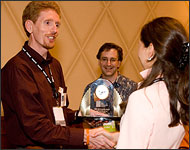 |
|
| Ekaterina & Eric accept Best Spec Lead award |
 |
Ekaterina says her main
contribution has been to lay the foundation for effective communication within the Expert
Group and share comments from the community. She is spearheading the Reference Implementation
(RI) and Technology Compatibility Kit (TCK) development efforts for JSR 253.
Eric is a distinguished member of the technical staff at Motorola and a member of the Java-Linux
software platform architecture team for the mobile devices business. He has focused on telephony
control APIs for the Java-Linux platform architecture, as well as connectivity protocols. Eric's
involvement in the JCP started with JSR 253, which merged his experience developing APIs at Motorola
with Siemens' work in this area. Eric says their combined experience helped get JSR 253 off to a quick
start by providing a sound starting point for the JSR and the necessary technical expertise to guide
development of the specification and resolve issues.
SURESH CHITTURI
Suresh Chitturi is a senior research engineer and project manager at Nokia Research Center.
His involvement with the JCP started mid-2003 when he became an active member of the Expert
Group for JSR 226, Scalable 2D Vector Graphics API for J2ME.
He was also the editor of JSR 226 specification and played an important role in synchronizing Mobile
SVG specification between JCP and W3C. Suresh is now the Spec Lead of JSR 226, which includes the
responsibility of leading the diverse Expert Group, developing the Reference Implementation (RI)
and Test Compatibility Kit (TCK), and possible future work with respect to J2ME and SVG mobile
technologies. For the past few years at Nokia, Suresh has focused on developing mobile vector
graphics technologies and solutions, particularly SVG. Suresh also represents Nokia in several
high profile mobile Standards Organizations (SDO) such as W3C, 3GPP, and OMA.
BART CALDER and JON COURTNEY
Bart Calder and Jon Courtney are both senior staff engineers at Sun and co-Spec Leads for JSR 216, Personal
Profile 1.1 and JSR 217 Personal Basis Profile 1.1. The two have worked together for many years and
they shared the responsibilities of Expert Group leadership. Jon's experiences as a Spec Lead go way back, having led the Java TV API before the JCP program came to be, JSR 62 Personal Profile Specification, JSR 68 JSME Platform Specification, JSR 129 Personal Basis Profile Specification, and JSR 197 Generic Connection Framework Optional Package for the J2SE Platform.
For the past eight years Bart has been involved with defining Java technology for consumer devices. He has contributed to the definition of a number of successful consumer technologies including the areas of interactive television (Java TV API, DVB-MHP, ATSC DASE), J2ME platform, and other J2ME specification efforts within the JCP program. Bart also represents Sun Microsystems in a number of international standards activities. Prior to his current role he was the lead for the JavaBeans Activation Framework.
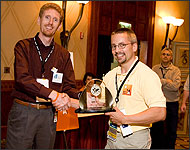 |
|
Jim Van Peursem accepts
Most Innovative JSR Award |
 |
JSR 271 Mobile Information Device Profile 3
(MIDP3) received THE MOST INNOVATIVE JSR for Java Micro Edition award. MIDP3
enhances the MIDP2 profile with features that include over-the-air deliverable
shared libraries for MIDP, while maintaining MIDP2 content backward compatibility.
These new features, which enable a new market for MIDP middleware developers,
consist of the ability to run multiple concurrent MIDlet suites simultaneously within
a single VM and the ability to run MIDlets on CLDC, CDC, or OSGi environments.
A substantially richer user interface is also included, as well as support for secondary displays, secure RMS stores, removable media, multiple network interfaces, Internet Protocol Version 6, extensive device capabilities query, and so forth. Spec Lead Jim Van Peursem of Motorola accepted the award.
JSR 257
Contactless Communication API
Technologies based on Radio Frequency Identification (RFID) and Near Field Communication (NFC) summon an increasing share of attention. RFID technology can be used in item identification, for example, and NFC technology enables peer-to-peer communication between two NFC devices. These technologies open new and innovative application areas. Jaana Majakangas of Nokia is the Spec Lead for JSR 257 Contactless Communication API to provide a Java API for these technologies. With JSR 257 the developer can extend the use of RFID and NFC technologies into mobile applications. In addition, JSR 257 gives mobile Java applications access to the information on the bar codes. Bar codes are already widely used all around the world, so this opens up new application areas for the developers.
JSR 259
Ad Hoc Networking API enables communication between mobile devices in a bearer agnostic peer-to-peer ad hoc network environment. This generic programming interface provides all necessary interfaces, tools, and abstractions to quickly build P2P Java applications that allow two devices to interact in a service provider-consumer model environment. JSR 259 makes it possible to use the same Java application to transparently access a UPnP or a Rendez-Vous enabled Printer. Jean-Yves Bitterlich of Siemens AG is the Spec Lead for JSR 259.
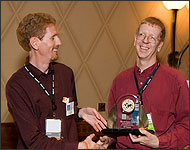 |
|
Bill Shannon accepts
Best Spec Lead award |
 |
Bill Shannon accepted the award for MOST OUTSTANDING SPEC LEAD for Java Standard/Enterprise Edition.
Bill, a distinguished engineer at Sun, has led several JSRs and is currently the Spec Lead
for JSR 244, Java Enterprise Edition 5, which is expected to
simplify the platform and make it easier for a broader spectrum of developers to use. Having been
with Sun since 1982, Bill previously worked on the JavaMail API, HotJava Views product,
Common Desktop Environment, Solaris operating system, and all versions of SunOS. He graduated from
Case Western Reserve University with a master's in Computer Engineering.
DAVID NUESCHELER
David Nuescheler is CTO of Day Software and has been instrumental in seeing that company
grow from a small
multimedia agency to a global content management solution company.
David lives and works in Basel, Switzerland, where Day was founded in 1993. He has
participated in web site content management projects for high profile clients such
as McDonalds, Mercedes-Benz, Volkswagen, and Holiday Inn. David began working with Java technology in 1999 when the decision was first made to adopt the Java Platform for Day's entire suite of products. Since then, he has worked primarily on server-sided web projects as a solution and product architect. By 2001, he had joined the JCP program, and he currently is Spec Lead for JSR 170 Content
Repository for Java Technology API.
ANDREW EISENBERG and JIM MELTON
Andrew Eisenberg and Jim Melton are co-Spec Leads for JSR 225 XQuery API for Java (XQJ) and co-chairs of the World Wide Web Consortium's (W3C) XML Query Working Group. Andrew is a member of IBM's Information Management Standards and Open Software department, and he represented IBM on SQL/XML:2003 and the XML Query Full-Text Task Force. He also represented previous employers on standards and consortia bodies such as OMG and Transaction Processing Performance Council (TPC). Andrew has contributed to all versions of SQL, representing a number of companies in ANSI H2, beginning in 1985.
Jim has been the editor for all parts of the SQL standard for SQL-92, SQL:1999, and SQL:2003, and he has published five books covering various aspects of the SQL standard. Jim has represented his employer in the ANSI standards community and the United States in the international standards community for nearly two decades. A founding member of the SQLX Group, he is active in developing and editing a new part of the SQL standard, called SQL/XML, that specifies technology for effectively using SQL and XML together. He is an editor of the two parts of the suite of documents being developed by the Query WG: Functions & Operators and XQueryX. Jim is working on a new book that deals with querying XML data in various ways. Jim works for Oracle.
MARK HORNICK
Mark Hornick led the JSR 73 Java Data Mining effort and is now Spec
Lead for the next generation, JSR 247 Data Mining 2.0. He has experience in the design, implementation, and management of advanced distributed systems, including in-database data mining, distributed object management, and Java APIs. As a senior manager in Oracle's Data Mining Technologies group, Mark led the development of multiple releases of the Oracle Data Mining and Oracle Personalization software. He joined Oracle through Oracle's acquisition of Thinking Machines Corporation in 1999. Before that, he was involved in advanced telecommunications network management software, distributed transaction management research, and distributed object management research. Mark has also contributed to the Data Mining Group's PMML, ISO SQL/MM for Data Mining, and the Object Management Group's Common Warehouse Metadata.
THE MOST INNOVATIVE JSR for Java Standard/Enterprise Edition was awarded to JSR 175, A Metadata Facility for the Java Programming Language, which enables a new declarative style of programming that simplifies many programming tasks through the use of metadata. Metadata are annotations of fields, methods, and classes that indicate they should be processed in particular ways by development tools, deployment tools, or run-time libraries. Joshua Bloch, the former Spec Lead of JSR 175, looks forward to seeing how this "very open-ended JSR" will be put to use. Bill Shannon accepted the award on behalf of Sun Microsystems.
JSR 220
Enterprise JavaBeans 3.0 simplifies EJB from the developer's point of view without any compromise to its power or functionality. The JSR 220 Expert Group has achieved a major overhaul of the Enterprise JavaBeans programming model in eliminating its earlier complexity through the use of Java language metadata annotations, the elimination of unnecessary interface and deployment descriptor requirements, and by introducing a new Java persistence API targeted at object/relational mapping. Linda DeMichiel, a senior staff engineer with Sun, is the chief architect of EJB 2.0 and 2.1 and the Spec Lead for JSR 220.
JSR 270
Java SE 6 ("Mustang") Release Contents defines the feature set for the next major release of the
Java Standard Edition platform. The major themes of this release are expected to be compatibility
and stability; diagnosability, monitoring, and management; ease of development; enterprise desktop;
XML and web services; and transparency. Mark Reinhold is Sun's chief engineer for the Java 2
Platform, Standard Edition, and Spec Lead for JSR 270.
 |
Attendees were genuinely pleased to hear that the best Spec Leads were being recognized for the enormous -- and largely unacknowledged -- work they do for the JCP program and the Java Community at large, above and beyond their regular jobs. |
"Spec Leads are the unsung heroes in the whole Java process, and anything we can do
for the outstanding ones is good. Super Spec Leads have been chosen so far," says EC
member Mike DeNicola, director of Industry Relations for Fujitsu. Mike feels this is
an excellent start for making the process more open within the community and visible
to the public.
As a Star who knows, Jere Kapyaho of Nokia, agrees. "Spec Leads don't do much that is
visible, but their work load is significantly greater than a regular Expert Group
member. I appreciate the gesture and I hope it continues and gets more people."
In his group at Nokia, Jere is known for being an approachable mentor. When his
coworker Jaana Majakangas became Spec Lead of JSR 257, she relied on Jere for
advice. "I can see why he's a Star Spec Lead. I can see how people need experienced
Spec Leads to talk to. This program is great for helping new Spec Leads know who to
contact," she says.
Greg Czajkowski, a Senior Staff Engineer at Sun Microsystems and Spec Lead for JSR
121 hopes to hear more about the Stars' best practices. "There are so many different
Expert Groups and styles. I'd like to know if something is common in successful Expert Groups." Greg and others can read the Stars' profiles to uncover some of
the important factors in their work ethic and process.
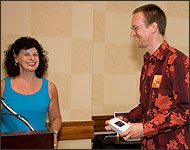 |
|
Andreas Ebbert
receives his recognition. |
 |
For some, unexpected practical benefits may accompany the honor. Andreas Ebbert of Nokia was
not going to be able to attend the conference this year, but he says, "Getting this honor
was the final straw that allowed me to come to JavaOne."
The program, designed to encourage all Spec Leads to aspire to Stardom, is perceived as
a serious endeavor. Jani Kinnunen, a senior research engineer at Nokia and JSR 180
Maintenance Lead, says it was important that the community's input played a part in
the decision, lending the program credibility and gravitas.
Suresh Chitturi, another senior research engineer for Nokia and a Spec Lead for JSR
226, is now considering how he can someday become a Star. He believes that the leadership
skills seen in a Star are typically gained by serving as a Spec Lead multiple times. He
also sees the value placed on networking and helping mentor the other people in his
organization.
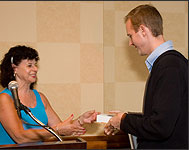 |
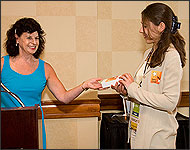 |
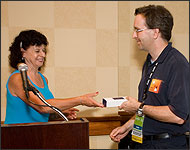 |
|
| David Nuescheler, Ekaterina Chtcherbina, and Eric Overtoom receive their recognition. |
|
Onno Kluyt, chair of the JCP program, sees the Star Spec Lead program as a step toward giving the
JCP program a human face. He says, "To open source groups, the JCP program can seem distant and
obscure. This puts key performers in the spotlight for their hard work and helps the community
to know who is doing what."
|
 |
 |
|
More JCP Program Awards Information
 . . . . . . . . . . . . . . . . . . . . . . . . . . . . . . . . . . . . . . . . . . . . . . . . . . . . . . . .
. . . . . . . . . . . . . . . . . . . . . . . . . . . . . . . . . . . . . . . . . . . . . . . . . . . . . . . .
|
 |
|